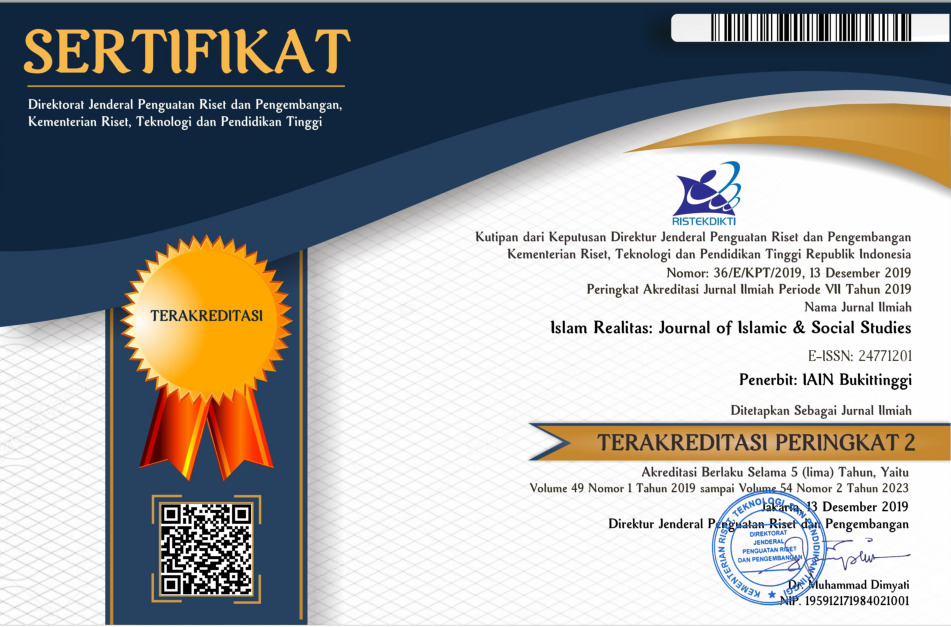Revivalism and Exegetical Reception of At-Tahm in Islamic Higher Education
Downloads
Additional Files
This research aims to determine whether or not revivalism ideology exists among academics in Islamic higher education institutes in the province of Southeast Sulawesi. It is accomplished through the use of an exegetical reception approach of their understanding of the AÌ„yÄt at-TahÌ£kÄ«m (Quran chapter al-Midah [5]:44-47). Data was gathered by combining survey technique development with in-depth interviews. The collected data was analyzed using a philosophical and phenomenological hermeneutic approach to assess the academic communitys understanding of AÌ„yÄt at-TahÌ£kÄ«m. According to the survey results, AÌ„yÄt at-TahÌ£kÄ«m is very popular among academics higher education institutes in Southeast Sulawesi. Most of the academic community’s information comes from religious studies on social media. They acknowledge and accept these verses as the foundation for the legitimacy of kaffah enforcement of Islamic law as the foundation for Indonesia’s political system. Meanwhile, the interviews show that most informants label those who disagree with the discourse with theological labels (kÄfir and thÄgÅ«t). As a result, even though these characteristics have not reached an extreme level, their comprehension is included in the revivalism ideologys characteristics.
Penelitian ini bertujuan untuk menakar eksistensi karakteristik ideologi revivalisme di kalangan sivitas akademika, khususnya di perguruan tinggi yang berada di wilayah provinsi Sulawesi Tenggara, Indonesia. Ini dilakukan dengan menerapkan pendekatan resepsi eksegesis atas pemahaman mereka terhadap AÌ„yÄt at-TahÌ£kÄ«m (Q. al-Midah [5]:44-47). Data penelitian ini dikumpulkan melalui elaborasi antara teknik survey dan wawancara mendalam secara bersamaan. Data yang diperoleh kemudian dianalisis mengggunakan pendekatan hermeneutika filosofis dan fenomenologis guna menakar pemahaman sivitas akademika terhadap AÌ„yÄt at-TahÌ£kÄ«m. Hasil survey membuktikan bahwa AÌ„yÄt at-TahÌ£kÄ«m cukup populer bagi kalangan sivitas akademika di Sulawesi Tenggara. Informasi tentangnya mayoritas diakses oleh sivitas akademika dari kajian-kajian keagamaan di media sosial. Mereka mengenal dan memahami ayat-ayat itu sebagai basis legitimasi wajibnya penegakan syariat Islam secara kaffah sebagai basis sistem politik pemerintahan di Indonesia. Sedangkan hasil wawancara membuktikan bahwa mayoritas informan menggunakan label-label teologis (kafir dan thagt) terhadap orang-orang yang menolak wacana tersebut. Meskipun pemahaman mereka dapat dikategorikan mengandung karakteristik ideologi revivalisme, tetapi belum termasuk level yang ekstrem, sehingga masih berpeluang bagi mereka untuk mendapatkan pembinaan.
Books
Al-Andalūsī, Imām Abū Ḥayyān. Tafsīr An-Nahr Al-Mādd. Dubai: Dār al-Ḥail, 1995.
Al-Asy‘ārī, Abū Ḥasan. Maqālāt al-Islamiyīn wa al-Akhṭā’ al-Muṣallīn. Beirut: Maktabah al-Aṣriyyah, 1990.
Al-BaliÌ„khiÌ„, MuqÄtil bin SulaimÄn. Al-WujÅ«h wa an-NazÌ£Äir fiÌ„ al-Qur’Än al-‘AzÌ£iÌ„m. Edited by HÄtim SÌ£ÄlihÌ£ adÌ£-DÌ£Äman. Dubai: Markaz JÄmi’ah al-MÄjid li ṠiqÄfah wa at-TurÄṡ, 2006.
Chandler, Michael, and Rohan Gunaratna. Countering Terrorism: Can We Meet the Threat of Global Violence? London: Reaktion Books, 2007.
Choueiri, Youssef M. Islamic Fundamentalism. Boston: Massachusetts: Twayne Publishers, 1990.
Dekmejian, R. Hrair. “Islamic Revival: Catalysts, Categories, and Consequences.†In The Politics of Islamic Revivalism: Diversity and Unity, edited by Shireen T. Hunter, 12. Indiana: Indiana University Press, 1988.
Esposito, John L, and John Obert Voll. Makers of Contemporary Islam. New York: Oxford University Press, USA, 2001.
Heywood, Andrew. Political Ideologies : An Introduction. Edisi 6. London: Palgrave, 2017.
Ibn KaṡiÌ„r, AbuÌ„ al-Fidā’ ‘ImaÌ„duddiÌ„n Ismā‘iÌ„l b.‘Umar. TafsiÌ„r Al-Qur’Än Al-’AẓiÌ„m. Edited by Sami bin MuhÌ ammad Salamah. Vol. 3. Riyadh: DÄr Thaybah li an-Nasyr wa al-Tawzī’, 1999.
Khan, MA Muqtedar. “Islam as Identity: After a Century of Islamic Revivalism.†In Islam and Good Governance, 43–76. New York: Palgrave Macmillan, 2019.
ManzÌ£uÌ„r, Ibnu. LisÄn al-‘Arab. Beirut: DÄr SÌ£Ädir, 1990.
Al-Mawardī, Abī al-Ḥasan ‘Alī bin Muḥammad. Tafsīr al-Mawardī. Beirut: Dār al-Kutub al-‘Ilmiah, 2010.
An-Najar, ‘Amir. Fī Mażāhib al-Islāmiyyin. Cairo: Al-Hai’ah al-Miṣriyyah al-‘Āmmah li al-Kitāb, 2005.
Olivier, Bob. Islamic Revivalism and Politics in Malaysia. Singapore: Springer International Publishing, 2020.
Pamungkas, Arie Setyaningrum. “Membela Islam? Dakwah, Konstruksi Moralitas dan Ruang Publik Muslim dalam Sejarah Media Islam Di Indonesia.†In Agama dan Negara Di Indonesia: Pergulatan Pemikiran dan Ketokohan, edited by Sri Margana, Siti Utami Dewi Ningrum, and Abmi Handayani, 9–31. Yogyakarta: Ombak, 2017.
Quthb, Sayyid. fī Ẓilāl al-Qur’ān. Cairo: Dār asy-Syurūq, 2003.
Rafiq, Ahmad. Living Qur’an: Teks, Praktik Dan Idealitas Dalam Performasi Al-Qur’an. Bantul: Lembaga Ladang Kata, 2020.
Ar-Rāzī, Muḥammad bin ‘Umar. Mafātih al-Ghaib. Beirut: Dār Ihyā’ al-Turāṡ al-’Arabī, 2000.
Shihab, Quraish. Tafsîr Al-Misbâh; Pesan, Kesan Dan Keserasian Al-Qur`An. Jakarta: Lentera Hati, 2002.
Asy-Syaḥrastānī, Abū al-Fataḥ. Al-Milāl wa an-Nihāl. Edited by Amir ‘Alī Mahna and ‘Alī Ḥasan Fa’ur. Beirut: Dār al-Ma‘rifah, 1993.
Ath-ThabariÌ„, MuhÌ£ammad bin JariÌ„r. JÄmī‘ al-BayÄn fiÌ„ Ta’wiÌ„l Ayi al-Qur’Än. Beirut: Mu’assasah ar-RisalÄh, 2000.
Tenriawaru, Andi. Pergerakan Revivalisme Islam Timur Tengah Ke Indonesia. Gowa: Jariah Publishing Intermedia, 2020.
Voll, John Obert. Islam Continuity and Change in the Modern World. Second Edi. Syracuse: Syracuse University Press, 1994.
Watt, William Montgomery. The Formative Period of Islamic Thought. Edinburgh Univ. Press, 1973.
Zamroni, Zamroni. “Konsep Kafir Menurut Khawarij.†IAIN Sunan Ampel Surabaya, 1999.
Journals
Andersen, Jan Christoffer, and Sveinung Sandberg. “Islamic State Propaganda: Between Social Movement Framing and Subcultural Provocation.†Terrorism and Political Violence 32.7 (2020): 1506–1526.
Arifuddin, Arifuddin. “Pandangan dan Pengalaman Dosen UIN Alauddin Makassar dalam Upaya Mengantisipasi Gerakan Islam Radikal di Kalangan Mahasiswa.†Al-Ulum Vol. 16.2 (2018): 435–454.
Arnon, Ruth Soulé. “Muslim Revivalism and Higher Education.†History of Education Quarterly 22.4 (1982): 461–478.
Celso, A. N. “The ‘Caliphate’ in the Digital Age: The Islamic State’s Challenge to the Global Liberal Order.†International Journal of Interdisciplinary Global Studies 10.10 (2015): 1–26.
Chozin, Muhammad Ali. “Strategi Dakwah Salafi di Indonesia.†Jurnal Dakwah 14.1 (2013): 1–25.
Daniya, Usman Abubakar, and Umar Muhammad Jabbi. “A Reinterpretation of Islamic Foundation of Jihadist Movements in West Africa.†EAS Journal of Humanities and Cultural Studies 2.1 (2020): 1–5.
Groenewald, Thomas. “A Phenomenological Research Design Illustrated.†International Journal of Qualitative Methods 3.1 (2004): 42–55.
Hadiyanto, Andy, Dewi Anggraeni, and Rizki Mutia Ningrum. “Deradikalisasi Keagamaan: Studi Kasus Lembaga Dakwah Kampus Universitas Negeri Jakarta.†Jurnal Pendidikan Islam Rabbani 1.1 (2017): 1–20.
Houben, Vincent J H. “Southeast Asia and Islam.†The Annals of the American Academy of Political and Social Science 588.1 (2003): 149–170.
Jauss, H. R., and E. Benzinger. “Literary Aistory as A Challenge to Literary Theory.†New Literary History 2.1 (1970): 7–37.
Karman, Karman. “Dominasi Wacana Anti-Politik Barat Pada Media-Muslim Revivalis (Analisis Wacana Model Teun Van Dijk Tabloid Media Umat Edisi Pemilu 2014).†Jurnal Studi Komunikasi dan Media 18.2 (2014): 229–245.
Leeuw, Edith D. de. “Mixed-Mode Surveys and the Internet.†Survey Practice 3.6 (2010): 1–5.
Lestari, Ambar Sri, and Shabrur Rijal Hamka. “Penggunaan dan Pemaanfaatan Cyberspace dalam Gerakan Pemikiran Hizbut Tahrir.†Al-Izzah: Jurnal Hasil-hasil Penelitian 13.1 (2018): 16–33.
Moll, Yasmin. “Televised Tears: Artifice and Ambivalence in Islamic Preaching.†Comparative Studies of South Asia, Africa and the Middle East 41.2 (2021): 153–165.
Nasr, Seyyed Vali Reza. “Democracy and Islamic Revivalism.†Political Science Quarterly 110.2 (1995): 261–285.
Nurhakim, Moh. “Gerakan Revivalisme Islam Dan Wacana Penerapan Syariah Di Indonesia: Telaah Pengalaman PKS Dan Salafi.†Ulul Albab: Jurnal Studi Islam 12.1 (2011): 1–14.
Oun, Musab A., and Christian Bach. “Qualitative Research Method Summary.†Journal of Multidisciplinary Engineering and Science and Technology 1.5 (2014): 252–258.
Rijal, Syamsul. “Indoctrinating Muslim Youths: Seeking Certainty Through An-Nabhanism.†Al-Jami’ah: Journal of Islamic Studies 49.2 (2011): 253–280.
Rofhani, Rofhani. “Melacak Gerakan Radikal Islam Dari Wahabisme Ke Global Salafisme.†Religió: Jurnal Studi Agama-agama 5.1 (2015): 66–91.
Segers, R. T., H. R. Jauss, and T. Bahti. “An Interview with Hans Robert Jauss.†New Literary History 11.1 (1979): 83–95.
Sesmiarni, Zulfani. “Membendung Radikalisme Dalam Dunia Pendidikan Melalui Pendekatan Brain Based Learning.†Kalam 9.2 (2015): 233–252.
Smith, M.L. “Publishing Qualitative Research.†American Educational Research Journal 24.2 (1987): 173–183.
Thiselton, Anthony C. “Reception Theory, HR Jauss and The Formative Power of Scripture.†Scottish Journal of Theology 65.3 (2012): 289–308.
Ubaidillah. “Global Salafism Dan Pengaruhnya di Indonesia.†Thaqafiyyat: Jurnal Bahasa, Peradaban dan Informasi Islam 13.1 (2012): 35–48.
Wahab, Laode Abdul. “Metamorfosa Radikalisme Pada Lembaga Pendidikan di Sulawesi Tenggara.†Shautut Tarbiyah 22.1 (2016): 69–90.
Wedi, Agus. “Remoderasi Islam Melalui Re-Interpretasi Al-Quran.†Shahih: Journal of Islamicate Multidisciplinary 5.2 (2020): 58–76.
Wijsen, Frans, and Peter Tumainimungu Mosha. “Bakwata Is Like A Dead Spirit To Oppress Muslims: Islamic Revivalism And Modes of Governance In Tanzania.†Utafiti 14.2 (2020): 223–241.
Yousif, Ahmad F. “Islamic Revivalism in Malaysia: An Islamic Response to Non-Muslim Concerns.†American Journal of Islamic Social Sciences 21.4 (2004): 30–56.
Yun, Gi Woong, and Craig W. Trumbo. “Comparative Response to A Survey Executed by Post, E-Mail, & Web Form.†Journal of Computer-Mediated Communication 6.1 (2000): 6–13.
Zuhdi, M. Nurdin. “Kritik Terhadap Pemikiran Gerakan Keagamaan Kaum Revivalisme Islam Di Indonesia.†Akademika: Jurnal Pemikiran Islam 16.2 (2011): 171–192.
———. “Kritik Terhadap Penafsiran Al-Qur’an Hizbut Tahrir Indonesia.†Akademika: Jurnal Pemikiran Islam 18.2 (2013): 1–25.
Online Database
Buletin Dakwah Kaffah. “Hukum Ilahi di Atas Konstitusi.†Buletin Dakwah Kaffah Edisi 129, 2020. <https://buletinkaffah.id/edisi-129-hukum-ilahi-di-atas-konstitusi/> {accesed 25 July 2020}
Thesis or Working Paper
Rafiq, Ahmad. “The Reception of the Qur’an in Indonesia: A Case Study of the Place of the Qur’an in a Non-Arabic Speaking Community.†ProQuest Dissertations and Theses, 2014. <https://scholarshare.temple.edu/bitstream/handle/20.500.12613/3439/
Copyright (c) 2022 Abdul Muiz Amir, Fatira Wahidah, Muh Iksan, Yusrifah Halid

This work is licensed under a Creative Commons Attribution-ShareAlike 4.0 International License.
Authors who publish with this journal agree to the following terms:
- Authors retain copyright and grant the journal right of first publication with the work simultaneously licensed under a Creative Commons Attribution License that allows others to share the work with an acknowledgment of the work's authorship and initial publication in this journal.
- Authors are able to enter into separate, additional contractual arrangements for the non-exclusive distribution of the journal's published version of the work (e.g., post it to an institutional repository or publish it in a book), with an acknowledgment of its initial publication in this journal.
- Authors are permitted and encouraged to post their work online (e.g., in institutional repositories or on their website) prior to and during the submission process, as it can lead to productive exchanges, as well as earlier and greater citation of published work (See The Effect of Open Access).









